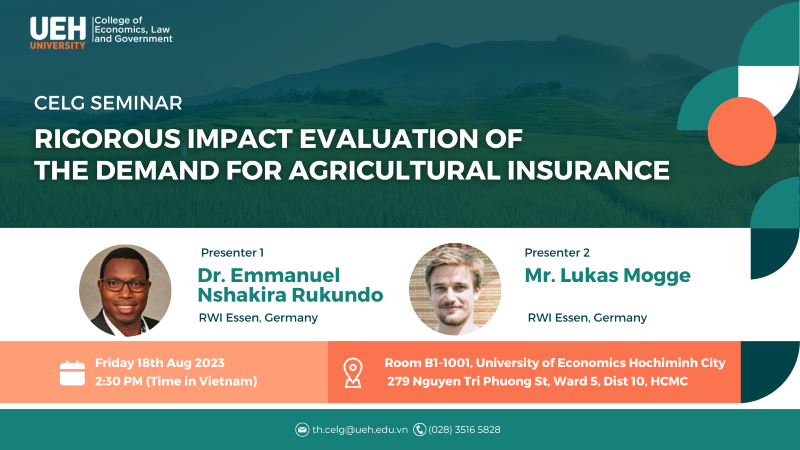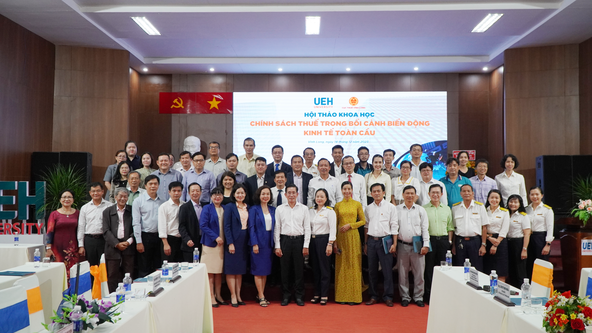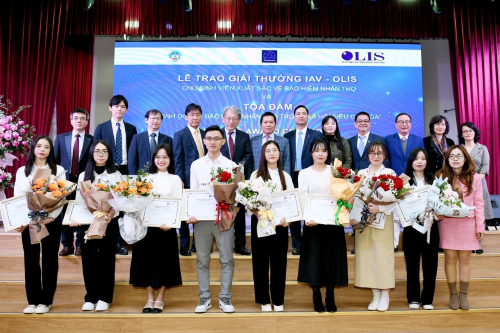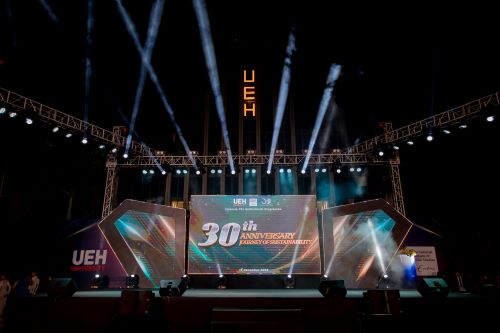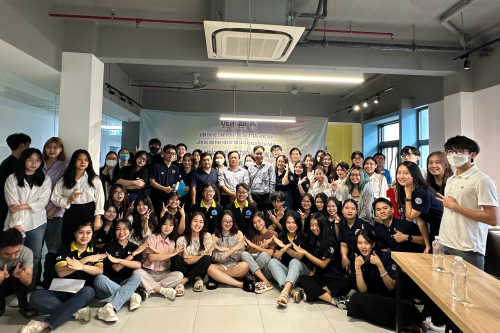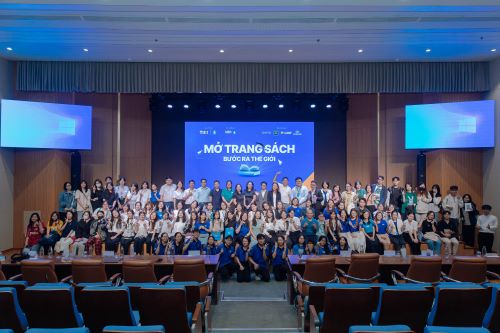- 18 Aug 2023
- 2023
[CELGS_18-08-23] Rigorous Impact Evaluation of the Demand for Agricultural Insurance
Dear Lecturers, Researchers, and Students,
The College of Economics, Law and Government would like to respectfully invite lecturers/ researchers to come and share your experiences at the CELG seminar:
- Title: Rigorous Impact Evaluation of the Demand for Agricultural Insurance
- Time: 2:30 PM (Time in Vietnam), Friday, Aug 18, 2023
- Presenters: Dr. Emmanuel Nshakira Rukundo and Mr. Lukas Mogge, RWI Essen, Germany
- Location: Room B1-1001, University of Economics Ho Chi Minh City, 279 Nguyen Tri Phuong St, Ward 5, Dist 10, HCMC
Climate change increases the intensity and frequency of extreme weather events. Smallholder farm households in the Global South that depend on weather conditions for their living are particularly affected. Not only are those households more geographically exposed to extreme weather events, but they are also less resilient when hit by such shocks. With climate change progressing rapidly, there is a pressing need to provide effective adaptation instruments that assist farm households in the Global South in adapting to increasingly extreme weather conditions. Parametric insurance (also referred to as index-based or trigger-based insurance) is a market-based adaptation instrument aimed at increasing the climate resilience of farm households. Policyholders receive insurance payouts whenever an index, such as rainfall or temperature, defined at an aggregated geographical level exceeds or falls short of a predefined threshold. If an extreme weather event occurs, insurance payouts are expected to help households recover faster from the shock-induced damages.
Since the late 1990s, parametric insurance has been piloted in low- and middle-income countries globally. Most of these programs struggle with low take-up rates. To better understand the barriers to demand for agricultural (parametric) insurance, the German Institute for Development Evaluation (Deval) will fund the impact evaluation of a Trigger-Based Agricultural Micro Insurance in Vietnam, aiming at increasing the climate resilience of smallholder farmers.
The research project aims to implement multiple survey rounds of a panel survey among rice farmers in the Mekong Delta region. The project aims at providing new and methodologically rigorous evidence on the following research questions:
(1) Does access to parametric agricultural insurance in Vietnam enhance households’ resilience?
(2) Do premium discounts encourage insurance uptake among farm households?
(3) Does training on product understanding encourage insurance uptake?
(4) Does providing farm households with access to climate projections encourage insurance uptake?
About Presenters:
Emmanuel Nshakira Rukundo is a Senior Researcher at the RWI Essen in the Climate Change and Development Group. He is also associated with the German Institute for Development and Sustainability (IDOS, formerly, German Development Institute) and the Institute for Food and Resource Economics at the University of Bonn.
His research covers social protection (health insurance policies and cash transfers), education and labour market issues, and more recently, agricultural risk management.
Lukas Mogge is a researcher at RWI’s Economic Policy Lab "Climate Change, Development and Migration" since July 2023. Lukas studied Economics at the Humboldt University of Berlin and the Freie Universität Berlin. He studied Development Studies at the London School of Economics and Political Science. Lukas is a doctoral candidate at the Potsdam Institute for Climate Impact Research (PIK) and the Ruhr University Bochum.
Lukas research interests are the socio-economic consequences of climate change, climate adaptation strategies, and the evaluation of development cooperation and humanitarian aid.
To receive CELG seminar information, please fill out this form: //go.sbdweb.com/CELG seminar information.
To present and submit a report, please fill out this form: //go.sbdweb.com/CELGseminarpresenter.

